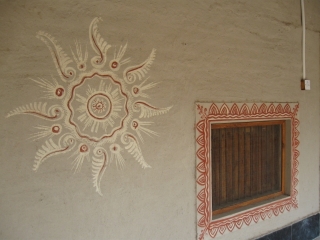You spoke about mind, body and heart. Can you go into a little bit more detail and talk about that? What are some of the key ideas of the Nai Taleem way of education?
Sushma Sharma: Let me explain it through an example. It is integrated learning, because we can’t compartmentalize life as Mathematics and Language and Chemistry or Science. You have to deal (with) life holistically; because it is holistic in nature. So we come up with such kinds of experiences that help children understand the social dimension of it.
Suppose there is an agricultural – farming – experience that they go through. Then they also read some of the news related to farming – like if there is depletion of soil. In Maharashtra, a survey showed that there was much depletion of sulphur and phosphorus and nitrogen – it threatened the food production in the state. Now, how (do) children look at this news and relate it to food autonomy? Otherwise we have to import food, and that makes it more difficult, and in some ways it increases our dependency on others.
So how do we understand the concept of freedom in relation to food autonomy? – This was something which came (up as a) part of Independence Day celebrations. The whole week was used to discuss such issues. Similarly, the social scenario – a number of issues like discrimination between men and women – sex-discrimination, were brought up. And children discussed different news items and then shared their own understanding.
This is how whatever they do – even cooking – is related with all such aspects. And they are asked to look into their families, to see the neighborhood – how things are happening – and then form their own views. That is how they relate the work they do and the issues that come up in the society – and then (we encourage them to) think about the issues and develop their own views and express through their own language. That is how all dimensions are taken care of.
Could you tell us a little bit about what the role of textbooks in Nai Taleem?
Sushma Sharma: A carefully crafted textbook could be helpful, the reason being that we don’t (always) have teachers creative enough and with a good understanding of disciplines. They may not really know how a child will be able to learn different things in a gradual hierarchy of concepts. So it is good for a teacher to use a textbook first. But then, that should not be an end in itself. That can give a good base for a teacher to understand things and then creatively build on it – how can we bring in social reality, how can we bring (in) other natural facts and realities – how can we bring all these together and make (the) child reflect on these issues? Or how do we add on to whatever has been stated in the textbooks, with different kinds of experiments and opportunities to learn? – That is to make it a more holistic experience.
So yes, a textbook is needed for a teacher as a beginning. But then gradually, he or she will have to learn to go beyond it.
